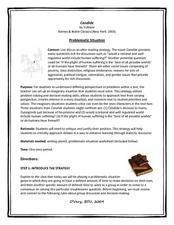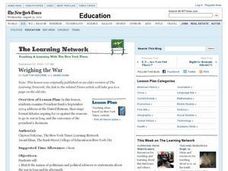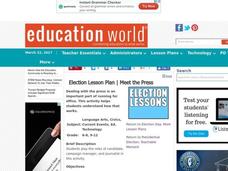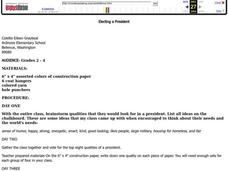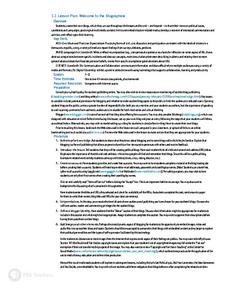Curated OER
Do Presidential Candidates Need to Be Good Debaters?
Blogs can be a good way for learners to engage in writing, critical thinking, and social media in a formal way. The New York Times has provided learners age 13-18 with an article, background information, and several prompts to get them...
Curated OER
Candide: Problematic Situation
"Would a rational and well-regulated world include human suffering?" "If the plight of human suffering is the 'best of all possible worlds' do humans have freewill?" Class members develop their position on an issue raised by Candide,...
ProCon
Drone Strikes Overseas
Should the United States continue the practice of using drone strikes abroad? Readers explore the top pro and con arguments in preparation for a debate or discussion about the topic. They read about the history of drone strikes, view a...
Curated OER
Weighing the War
Study opposing viewpoints with this lesson, which examines President Bush's September 2004 address at the United Nations. Middle schoolers study the text of the address, and then stage formal debates arguing for or against the reasons to...
ProCon
Electoral College
The Electoral College's role in elections is sometimes confusing and controversial. Pupils use a debate topics website to research the pros and cons of the practice to debate whether the United States should still use the Electoral...
Curated OER
Presidential Endorsements: Newspapers Decide
Students read The Plain Dealer editorial about its "non-support" of a candidate and other articles about this and discuss the newspaper's role in the political process. Students then form an editorial board and debate which candidate...
Curated OER
Take a Stand!
Here is a four-corner debate-style activity specifically geared to election year issues. Learners group themselves according to whether they strongly agree, agree, disagree, or strongly disagree with statements that relate to elections...
Constitutional Rights Foundation
The Election of 1912
The Election of 1912: an election with four competitive opponents. Pupils get to know the candidates with informative reading passages that provide context to the election. Then, the class engages in a debate and answers questions as one...
Curated OER
Asking the Questions and Questioning the Answers
What would you ask a presidential candidate if you had the chance? Bring politics to your language arts classroom with this lesson plan, in which young readers brainstorm questions they would have liked the presidential candidates to...
Curated OER
Meet the Press
Young scholars participate in a role play revolving around political elections. The roles of candidate, campaign manager, and journalist emphasized in this activity. Students listen to candidate interviews that are available online.
Curated OER
Active Voice
Students identify the qualities that contribute to effective verbal and non-verbal communication. They use those qualities as criteria by which to judge an in-class political debate on education.
ProCon
President Bill Clinton
Was Bill Clinton a good president? Scholars set out to answer the question as they prepare for a class debate on the topic. They watch videos, review pros and cons, and read facts about the process of becoming a United States president....
Curated OER
Advanced Critical Reading: The Great Debates
In this critical reading worksheet, students read a passage about The Great Debates between Kennedy and Nixon and answer questions based on the reading.
Curated OER
Running (Check) Mate
Students consider qualities that the public seeks in a vice president, then analyze statements made by the vice presidential candidates and multimedia commentary on the debate by a Times reporter. For homework.
Curated OER
Who Could Have Been Who
Can word choice affect a candidate's likeability? Use a New York Times lesson to explore how a presidential candidate's likeability factor can fluctuate in public opinion polls. Young readers choose a presidential election from...
Curated OER
Examining the Form and Function of Campaign Speeches
An examination of stump speeches, one of the most important components of a presidential campaign, is made possible by accessing The New York Times Learning Network. After closely examining the form and function of stump speeches,...
Curated OER
Where Do They Stand?
In this presidential election worksheet, young scholars research the 2008 presidential candidates and create a booklet of candidate profiles that clearly differentiate each one. They also assume the identity of one of the candidates and...
Curated OER
Face the Nation! A Panel Discussion
Sixth graders simulate an election-year debate between opposing political parties. In this persuasive-speech lesson plan, 6th graders will work in teams to prepare for and participate in a debate between opposing parties. The lesson plan...
Curated OER
Electing a president
Students create a list of characteristics of a president and reach consensus about the most important qualities. In this electing a President lesson, students work in groups to choose the most important traits of a president and...
Curated OER
Covering the Campaign Trail: Technological Progress or Temporary Chaos?
Students study the changes in reporting and journalism techniques that have evolved due to advances in technology by reading an online transcript. They debate whether the technological advances are positive or negative in the reporting...
Curated OER
What are the Issues?
Seventh graders complete political analysis activities. In this political analysis lesson, 7th graders discuss party platforms and research party issues for their party's candidate's positions. Students complete an issues organizer and...
Curated OER
Welcome to the Blogosphere
Create a blog spot for your classroom and promote online discussions. There are several blogging websites listed here, and you can create one specific to each class or one collective site. Teach your learners how to post on the blog, and...
Curated OER
Presidential Elections
In this online/interactive vocabulary in conversation worksheet, students fill in the blanks to complete sentences using the words in the word bank. Students fill in 10 blanks.
Curated OER
Creating Hate: The Power of Words
Students explore why authors choose to use hate words in literature. In this power of words lesson, students complete group participation, journal entries, and written assignments to investigate the use of inflammatory...

